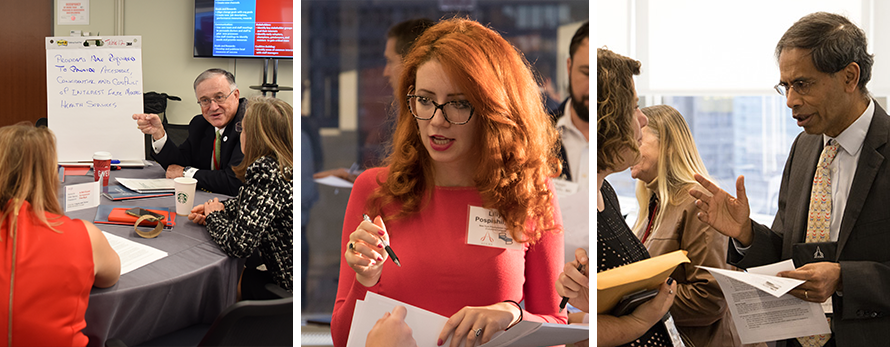
Improving Physician Well-Being, Restoring Meaning in Medicine
Overview

The ACGME is committed to exploring causes of burnout and sharing strategies for physician well-being. The ACGME’s focus on physician well-being has expanded in recent years to integrate well-being into its work in all dimensions—within the organization and through partnerships in the medical community—with the ultimate goal of reducing burnout, addressing well-being, and helping physicians rediscover joy and meaning in work.
Accreditation
In 2017, the ACGME revised its Common Program Requirements for all accredited residency and fellowship programs to address well-being more directly and comprehensively. The requirements emphasize that psychological, emotional, and physical well-being are critical in the development of the competent, caring, and resilient physician.
- Read more about the Common Program Requirements
Diversity, Equity, and Inclusion
Increasing diversity in the physician workforce is essential to achieving health equity. Inclusiveness and a sense of belongingness for all in GME learning environments are vital to ensure that diverse individuals are ultimately successful. Prerequisites for sustaining the types of environments that contribute to diverse physician well-being are the establishment of psychological safety and a trauma-responsive culture within medical education. The Department of Diversity, Equity, and Inclusion works with the GME community to develop strategies and promote tactics to provide safe, inclusive, and equitable learning environments for all residents, fellows, and faculty and staff members.
Leadership and Systems
To optimally integrate clinician well-being into all dimensions of the clinical learning environment, it is essential that leaders of these efforts are advocates for well-being at the systems level of the organizations that sponsor GME. The ACGME promotes these efforts in a number or ways, including engagement of executive leadership of Sponsoring Institutions through events such as the December 2019 CEO Summit on Well-Being, an event jointly sponsored with the National Academy of Medicine and Association of American Medical Colleges. Through meetings like these, participants at various levels of the organization develop a common framework and language to better align health system goals with clinician well-being goals. Additional work in this area is being completed through the Clinical Learning Environment Review (CLER) Program and the Department of Diversity, Equity, and Inclusion.
National Academy of Medicine Action Collaborative on Clinician Well-Being and Resilience
The Action Collaborative on Clinician Well-Being and Resilience, co-chaired by the ACGME, American Association of Medical Colleges (AAMC), and the National Academy of Medicine (NAM), includes more than 200 other organizations, working to promote physician well-being and resilience, leveraging its members’ influence to create a healthier, safer medical community. The Collaborative’s first two phases focused on building community and sharing ideas, while Phase III, now underway, focuses on laying the groundwork for a national strategy, developing a comprehensive approach to apply emerging lessons from the effects of COVID-19, and implementing evidence-based tools for clinician well-being.
National GME Well-Being Community Calls
The ACGME hosts national monthly calls with members of the graduate medical education (GME) community to discuss issues related to well-being. The group serves three purposes: 1) to share resources with and among programs on how they’re addressing well-being needs, 2) to provide the ACGME with feedback on the well-being needs within the clinical learning environment, and 3) to create a supportive environment that fosters community. These calls are open to anyone actively working in GME well-being. Those interested in participating should email their name, title, Sponsoring Institution, contact information, and a statement explaining how they support GME well-being to Bethanie Alden, MPA.
Research
The ACGME continues to conduct research on resident, fellow, and clinician well-being. These ongoing research efforts involve not only monitoring changes in the well-being of residents and fellows, but also measuring the effectiveness of the well-being interventions being implemented at programs and institutions across the country. The ACGME is most interested in interventions that can be implemented effectively across clinical learning environments. It is also interested in strategies that improve engagement and meaning in residents, fellows, and faculty members. Additionally, more research on physician/clinician well-being is available in the Journal of Graduate Medical Education.
Tools and Resources in Learn at ACGME
The ACGME has an abundance of tools and resources it has created and curated related to implementing well-being activities throughout GME and the clinical learning environment. Resources are geared toward both the individual and system-wide practice. Specific resources that can help institutions and programs meet the well-being-related requirements in the Common Program Requirements are also available. These resources are housed in the Learn at ACGME online education portal. Some resources are open access; others are free but require a free Learn at ACGME account; and a select few are proprietary.
